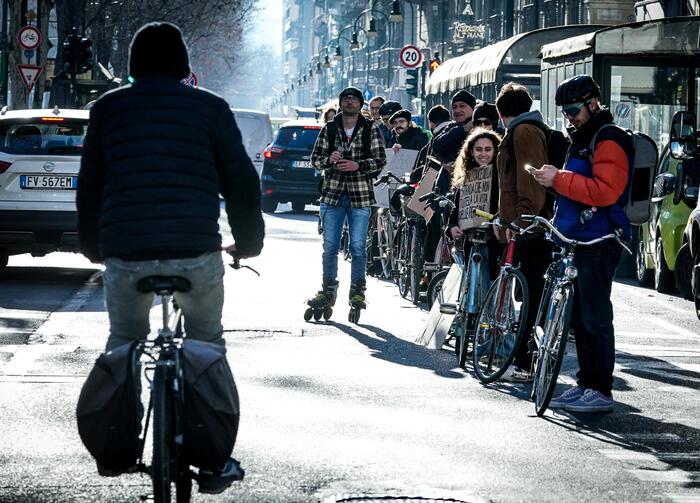Enlarge image
President of the European Commission von der Leyen
Photo: JOHN THYS / AFP
Ursula von der Leyen did not lack clarity when she appeared in front of the cameras at the EU Commission headquarters on Wednesday.
"We need to prepare for a complete disruption to Russia's gas supply," the commission president said, adding that it was "a likely scenario."
"Russia," von der Leyen said, "uses energy as a weapon."
It is now clear how von der Leyen imagines the EU's response.
It reads: save, save, save.
The "European Gas Demand Reduction Plan" proposed by the Commission would be a radical escape from dependence on Russian gas.
It provides that the EU countries reduce their consumption by 15 percent between August 1st and March 31st, 2023, measured against the average consumption of the same period in the past five years.
This should initially be done voluntarily.
However, should the Commission identify a “substantial risk of a severe gas supply bottleneck” due to a Russian supply freeze, for example, it could trigger an EU-wide emergency (“union alert”), according to the emergency plan.
Then the member countries would be obliged to save 15 percent of their previous consumption.
According to the draft, a corresponding request from three EU countries should also be sufficient to declare a state of emergency.
No more temperature specifications
The 15 percent reduction in consumption should lead to savings of around 45 billion cubic meters of natural gas across the EU - which, according to the Commission's calculations, should be enough to get through the next winter even with a complete stop to Russian natural gas supplies, even if it gets colder than average.
However, the Commission no longer wants to set specifications for temperatures in buildings.
An earlier draft stipulated that public and commercial buildings and offices should be heated to a maximum of 19 degrees and cooled to no less than 25 degrees with air conditioning.
There is no longer any mention of this in the draft regulation that has now been published.
Nor can the Commission implement the plan independently.
The member states must approve the project with a so-called qualified majority: 15 of the 27 states with at least 65 percent of the EU population would have to agree.
The commission hopes that this will happen as early as next Tuesday at a special meeting of the ministers responsible for energy issues.
An agreement is urgently needed, and the experts agree.
If Europe wants to counter Putin's gas attack, then not only drastic savings are necessary, they also have to take effect as quickly as possible.
And everyone has to participate, without only having their own interests in mind, which is probably the most difficult part of the exercise.
"The emergency plan is the minimum of what is needed to compensate for a loss of Russian imports," says Stefan Schönberger, an energy and climate expert at the Boston Consulting Group.
The management consultancy calculated what would have to happen in Germany in order to achieve the Brussels goals.
According to this, private households could save around three percent of their previous annual consumption if they reduced the room temperature in apartments by around two degrees.
If power plants and district heating boilers are switched from gas to coal or oil wherever possible, this could result in a reduction of around ten percent.
Another five percent are possible in industry through gas-saving technologies, for example in steel production, around one percent through lower temperatures in hotels, restaurants or other leisure facilities, another percent through longer running times for nuclear power plants.
Ideally, this could save up to a fifth of the previous gas volumes.
It would be an effort for households and power generators, and the industry would also be "massively hit according to the current status," predicts Schönberger.
"Even if Russia were to resume deliveries on a tight flame, as announced today, we must expect very high gas prices, which will cause financial difficulties for many private households and companies," he says.
In addition, the individual EU countries are affected to different degrees.
In Germany, Italy or the Netherlands, natural gas makes up a large part of the primary energy.
Others, on the other hand, such as Portugal, hardly import any gas from Russia – and may now be wondering why they should still reduce their consumption.
Germany under pressure
Germany in particular is now coming under pressure.
On the one hand, because it is partly responsible for the problems due to its longstanding special gas relationship with Russia.
On the other hand, because a large part of the energy has to go through Germany if it is to be routed from west to east or from north to south.
How solidarity the continent behaves depends not least on Germany.
In recent months, the Berlin government has not always excelled, as many in Brussels see it.
The shopping visit by Federal Minister of Economics Robert Habeck to the Emir of Qatar in the spring was seen as Berlin's solo effort, as was the purchase of floating liquid gas terminals, which other EU governments had also had their eyes on.
Italy, for example, which is now trying to stock up in North Africa.
Eastern European countries such as the Czech Republic or Slovakia have made themselves dependent on Russian gas supplies in a similar way to Germany.
Accordingly, they are now calling for European solidarity.
Poland, on the other hand, relied on gas sources outside Russia at an early stage and has always opposed the German Nord Stream 2 gas pipeline.
It is understandable that the government in Warsaw now sees little reason to limit its own consumption in favor of the Federal Republic.
Unsurprisingly, Hungary's right-wing head of government, Viktor Orbán, has already withdrawn from EU solidarity.
Last week he declared a state of emergency and announced that Hungary would stop supplying gas and other fuels to other EU countries from August.
Such a step should only be taken "with very specific justifications," said EU Energy Commissioner Kadri Simson, for example to protect public order or the economy.
However, "no disturbance of the Hungarian supply is known".
Von der Leyen said the Hungarian approach would be looked at closely.
"We will protect the internal market," said the head of the commission.
Other countries are also in the pillory.
France, for example, has always advertised the security of supply from its nuclear power plants.
But now so many reactors in the country are out of service due to technical problems that Europe is threatened not only with a bottleneck in gas but also with electricity in the next few months.
In its distress, the Parisian government has not known how to help itself in recent months other than to buy liquefied gas on a large scale – in Russia.
At the same time, the French Commissioner for Industry, Thierry Breton, is demanding that Germany, of all countries, which is co-governed by the Greens, should let its nuclear power plants run longer.
In fact, the continent only has a chance of averting a gas emergency if the EU countries stand together.
If they seal off their markets, disaster threatens, at least in some EU countries.
"Fragmentation is our greatest enemy," warned von der Leyen.
»Everyone would suffer if the EU internal market were disrupted.«
The EU has only reduced consumption by 5 percent
There are exemplary developments in some member states, as Energy Commissioner Simson praised.
Finland, for example, which was the first country to be cut off from Russian gas supplies, has since reduced its consumption by 54 percent.
The Netherlands, the only significant funding nation in Europe, have already saved 20 percent.
According to Simson, gas consumption in the EU as a whole has only fallen by a miserable five percent so far, said Simson.
"It's clearly not enough."
Von der Leyen, on the other hand, does not want to rely on a Russian concession.
The state-owned Gazprom group has proven to be a "completely unreliable supplier."
"And as we know, Gazprom is Putin." Twelve EU countries are already affected by a partial or complete stop of Russian gas supplies, and overall Russia is delivering less than a third of what it delivered a year ago.
According to von der Leyen, what will happen next is "unpredictable".
There could be a possible indication as early as Thursday – then, according to Moscow, the maintenance work on the Nord Stream 1 Baltic Sea pipeline that is said to be necessary should be completed.
People in Brussels, Berlin and other capitals are anxiously awaiting the gas flowing again.









